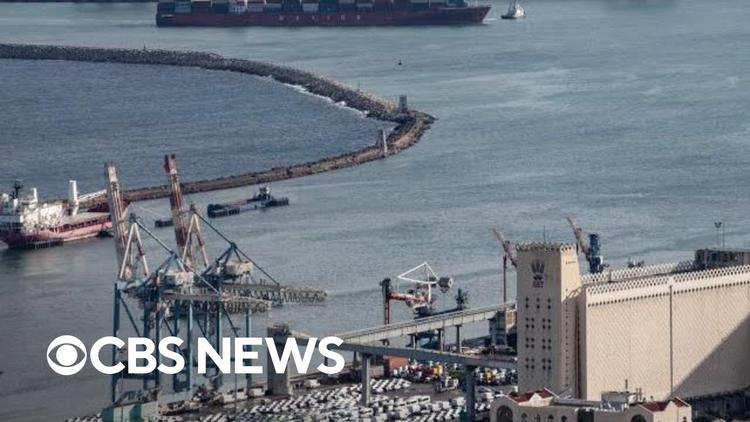Ann Arbor (Informed Comment) – On Saturday, Muhammad al-Bakhiti, a member of the Politburo of the Helpers of God (Houthi ) government of northern Yemen, announced that it had completely closed off shipping to Israel via the Arabian Sea and the Red Sea. Actually, the Helpers of God have more or less closed Red Sea shipping to everyone. He said that the Houthis had managed to idle the Israeli port of Eilat, referring to it by its pre-1948 name of Umm al-Rashrash. He pledged that the Houthis would expand their activities in the Red Sea and continue to strike at Israeli shipping and shipping headed for Israel, as well as at the Israeli navy.
He also said that his government would not allow any American shipments to Yemen, and called on other Arab countries to boycott not only Israeli but also American trade in the region.
The Gaza conflict has several theaters. There is the Israeli war of genocide on the Palestinians of Gaza, which has killed over 18,000 people and wounded tens of thousands, the vast majority of them innocent noncombatants, and destroyed or damaged about half the region’s housing stock along with other essential infrastructure and buildings. It has also left the civilian population without sufficient food or water and exposed to deadly infectious diseases.
Then there is the tense Israeli-Lebanese border, where Israel has bombed from fighter jets and Hezbollah has fired rockets, necessitating the evacuation of some of northern Israel.
There have been Shiite militia attacks on US personnel in Syria and Iraq, with more threatened.
And then there is the really important Red Sea front, where the Houthi government has targeted commercial vessels it says are ferrying goods and supplies to Israel, though it seems also to be hitting just any old merchant ship. The Houthis are Zaydi Shiites and form part of the Iran-led Axis of Resistance to Israeli political dominance in the Levant and the occupation of the Palestinians. The Houthis survived an eight-year war with Saudi Arabia and the United Arab Emirates, wealthy oil states allied with the United States that either recognize Israel (in the case of the UAE) or are considering it (the Saudis).

Yemen is a rugged country of impenetrable highlands and wildernesses. I’ve been there several times. The winding mountain roads outside Sanaa made me carsick. The Yemenis gave me khat for the nausea.
The country sits athwart the Arabian Sea, the Gulf of Aden and the 20-mile-wide Bab al-Mandeb or Mandeb Straits through which traffic between the Red Sea and the Indian Ocean passes. The UAE and its allies control the southern coast along the Gulf of Aden and the Arabian Sea, but the Houthis control some of the Red Sea coast and use their window on the sea to threaten shipping for their geopolitical purposes with drones, including Iran-made KAS-04 unmanned aerial vehicles. The Houthis have hit several container ships and a Norwegian oil tanker.
The Houthi government announced Saturday that it had launched a large number of drones toward the region of Eilat, Israel’s port city on the Gulf of Aqaba just off the Red Sea.

At the same time, the United States Central Command announced that its destroyers in the Red Sea had shot down 14 one-way attack drones.
The British Navy also weighed in, saying that a Sea Viper missile from the HMS Diamond had taken out a Houthi drone that threatened merchant shipping.
CBS News: “Houthis target ships in Red Sea, U.S. bases in Iraq and Syria face daily attacks”
As a result of the ongoing Houthi drone attacks on freighters, some of the world’s biggest and most important shipping corporations have announced that they will avoid the Red Sea and the Suez Canal for now. They are not only fleeing danger but also the dramatically spiking cost of insuring any vessels that ply those waters. The companies include Mediterranean Shipping Company (MSC), whose MSC PALATIUM III freighter was taken out of commission by a Houthi drone attack on Friday. They also include CMA CGM of France, Maersk of Denmark, and Hapag-Lloyd of Germany, according to the BBC.
Israeli shipping costs have shot up over 250%, and some insurers are refusing to insure their vessels.
The US plan to form a naval task force to escort container ships and protect them from the drones won’t work, because it won’t push down insurance costs. They could try to strike the Houthis, but 8 years of Saudi and UAE bombing of them did no good, so I wouldn’t hold my breath that lashing out would be effective. Moreover, the Biden administration doesn’t want the Gaza conflict to spread throughout the region and further destabilize it.
Some 10 percent of world trade goes through the Suez Canal on 17,000 ships a year. Nowadays, about 12% of the petroleum shipped by tanker goes through the Suez Canal, along with Liquefied Natural Gas shipments. These ships will now have to go around the Cape of Good Hope and skirt the west coast of Africa, adding over 10,000 nautical miles (over 12,000 landlubber miles) and 8 to 10 days to the journey, with all the consequent extra expenses of fuel and provisions. The shipping companies will be hurt by this change, as well as the countries along the Red Sea such as Ethiopia, Eritrea, Sudan, Egypt, Saudi Arabia, Jordan and Israel. The detour will contribute to supply chain shortages and cause an increase in the price of imported goods for many countries in Europe.



 © 2024 All Rights Reserved
© 2024 All Rights Reserved